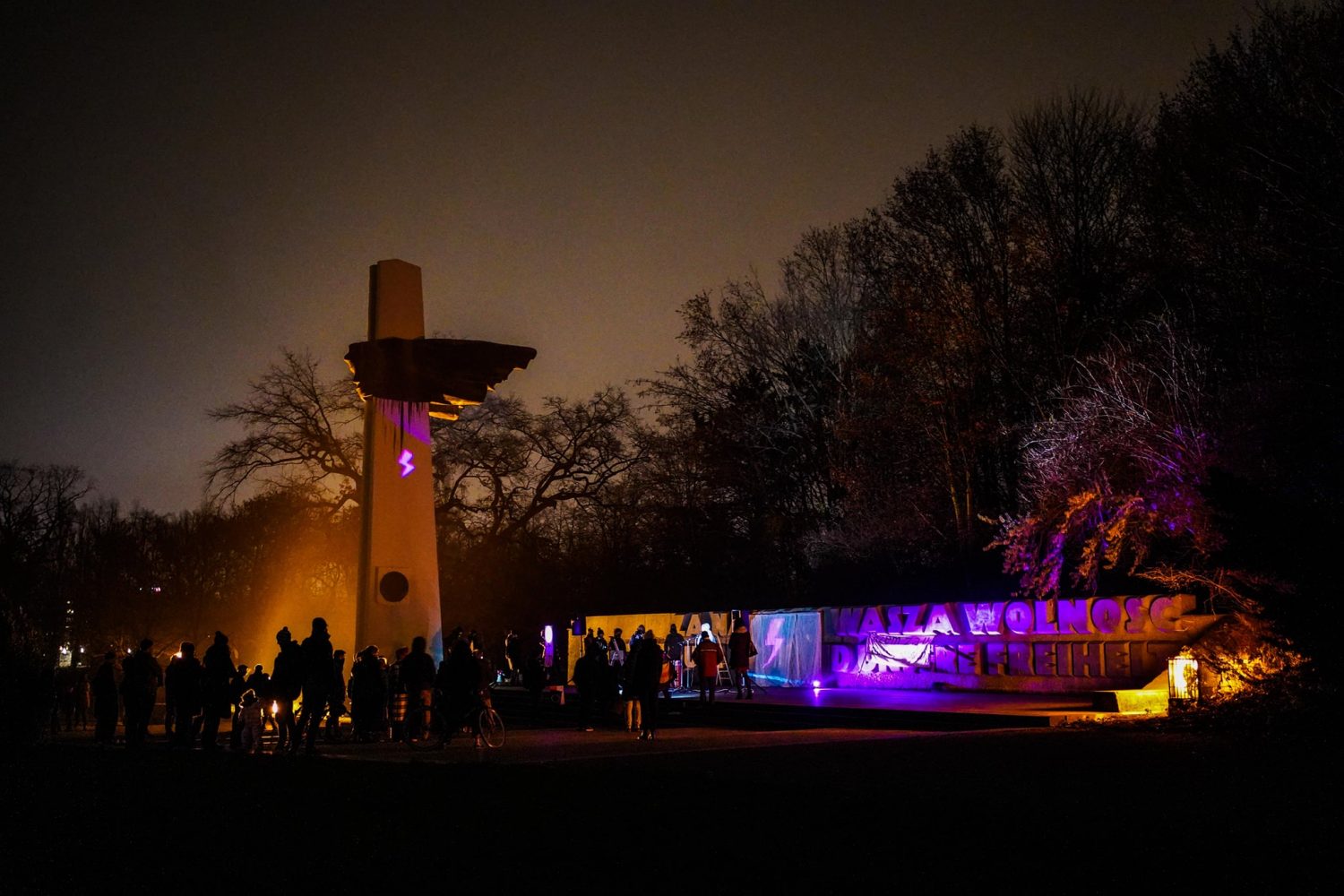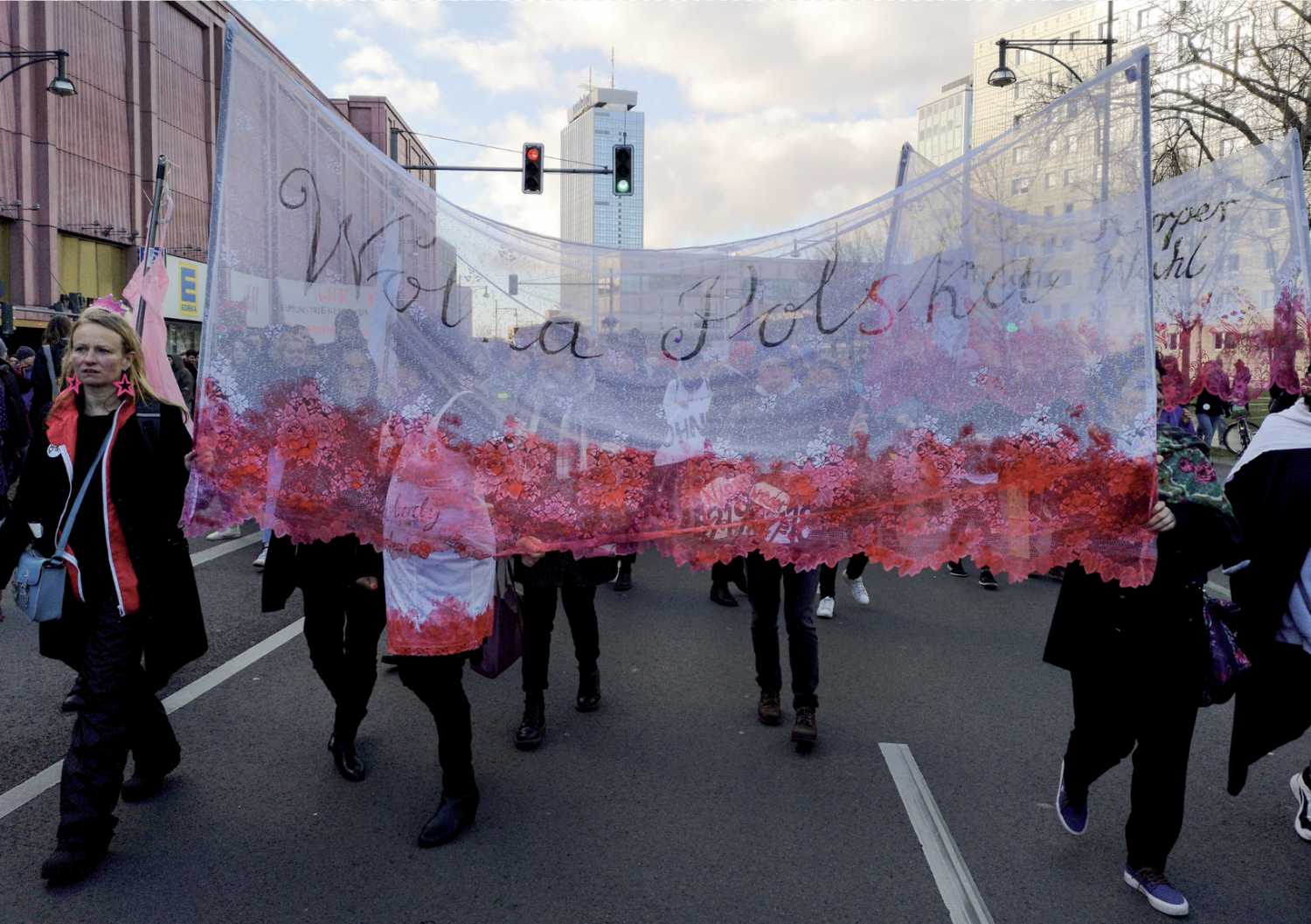Anna Krenz on Polish feminist protest art in Berlin
Since the election victory of the populist PiS party in December 2015, Poland is well on its way to becoming an autocracy. The policies of the government controlled by Jarosław Kaczynski have led to the collapse of the separation of powers, important institutions such as the Constitutional Tribunal, and led to the division of Polish society. From the very beginning, tens of thousands of Poles protested against these changes at home and abroad. This was also the case in Berlin.


When many of us, active but also hitherto uninvolved people, stood on the streets in April 2016, a new stage of the struggle for women’s rights in Poland began. The protests and mass disgust were a reaction to the first attempts of the conservative PiS party government and ultra-catholic organisations to tighten abortion laws. The process of building a new relationship in Polish- German civil feminist circles has also begun. Since April 2 2016, as Dziewuchy Berlin (Gals Berlin) we have been active in Berlin organizing demonstrations, pickets and artistic actions in solidarity with the Polish cause – from reproductive rights to free courts. We write articles for the press, write letters, sign petitions, speak at demonstrations and take part in discussions about Poland, and we constantly inform people in Germany about women’s and LGBTQ+ struggles for their rights and the situation in Poland. At the same time we stand in solidarity with other migrant women on the streets of Berlin and we engage in campaigns in the fight for women’s rights in Germany (e.g. Paragraf 218 and 219a).
One of the main activities of the collective has been political art – visual arts, literature and performance. As an artist, I believe that being ‘against’ (something) is not enough. That is why my share and my workload at the collective has been the creative process and art. Art serves as a tool and medium to address challenging issues, offering a way to reflect, evoke and express collective emotions, needed especially in times of the rise of authoritarian regimes. Artistic activities can also help to build communities, to bring people together across differences when unity, strength and solidarity are most needed. Political art is part of Polish culture and tradition, at home and for the Polish diaspora abroad.
In my artistic work I have always referred to political and social themes. Getting involved in activism, I have been making posters and graphics for actions and demonstrations, painting banners using the same tools, materials and methods as I use in my professional work. For each protest or action I come up with a separate visual concept specific to the theme, sometimes referring to previous works I have created (and still am) in the context of the art and gallery world. I perceive demonstrations as spectacles, as theatre, with ‘actors’ (speakers, musicians, performers), with a stage and scenography (public space), dramaturgy (speakers’ list and program) and the audience (participants of demonstration).
Polish migrant women are often discriminated against on many levels: on the basis of gender or being foreigners, while in their homeland they become redundant and unimportant because they left it behind. Through artistic and political activism, reaching back into history, we aim to create HERstory, to change the pattern and perception of Polish women as ‘inferior sisters’ or ‘victims’ (of history, the system, patriarchy, nationality) and to build a strong position for Polish women in Berlin. When we started our actions in 2016, we called for solidarity with women and LGBTQ+ in Poland. Later, by engaging with women’s rights and LGBTQ+ in Germany, we called for the opposite solidarity (unfortunately without success). Our artistic actions became our signature sign and our activities were recognized in Germany; we were awarded prizes for our actions: Feminist Green Pussyhat Prize in 2018 and Clara Zetkin Frauenpreis in 2021. At some point, we consciously took the decision to abandon the role of ‘inferior sisters from the East’. In 2022, we recognized and honoured other activists with our own prizes: Siostry*! Preis for Good Sisterhood and Feminist Collaboration.
So what did this paradigm shift in the perception of Polish migrant women in Berlin look like? Here are some important milestones:
2016 – Black Protest
Black Monday was a women’s strike across Poland, a culmination of the nationwide Black Protest campaign against the proposed abortion ban. For the demonstration location I chose the stairs of the Warschauer Brücke, which became the stage, surrounded by the audience – demonstrators dressed in black, who created the scenography for this “spectacle”. Just like in the theatre. The Black Protest showed the power of Polish women, it was the beginning of a new wave of international solidarity across borders. It was also the first and largest protest about Polish women to date.
2018 – Sisters in arms
We are part of many networks and coalitions in Germany, Poland and abroad. We are part of the Alliance for Sexual Self-Determination (Bündnis für sexuelle Selbstbestimmung), with which we actively work for reproductive rights. The history of legislation concerning pregnancy termination in Poland and Germany is partly common (partitions of Poland, Nazi regime) and partly similar (“compromises” of the 1990s) and also concerns contemporary Polish women who come to Germany to terminate their pregnancy.
2019 – Global Scream
Berlin is a city still divided. Every year for Women’s Day there are several marches (more every year), which unfortunately take different routes, due to ideological differences. In 2017, we managed to accomplish almost a miracle – to make both marches meet in one place – at our Polish protest in Oranienplatz. In 2019 it was not possible to gather the divided feminist marches in one place. Therefore, as part of the newly-founded Feministischer Frauen*streik (Feminist Women’s Strike), I proposed two artistic actions: symbolic strike #IchStreike and one minute of screaming #GlobalScream to unite us, at least for 1 minute (a year). Global Scream is a scream of rage, anger, regret – each of us knows these emotions, even if their causes differ. Anyone can scream. We don’t even have to speak the same language to become one voice. The voice of women. Since 2019, we perform Global Scream every year. In Poland the action was popularized later by an activist from Warsaw.
2020 – Botschaft der Polinnen*
Since PiS party took over power in Poland, it has taken over institutions, state offices, state-owned companies and of course state offices abroad – including embassies. With huge funds, the ruling party is also opening new institutions (for example, the Pilecki Institute in Berlin), universities or museums, some of which are duplicating existing ones. That is why I decided to open our own embassy – Botschaft der Polinnen* (double meaning in German, Botschaft as an embassy and as a message). Botschaft der Polinnen* is an artistic concept, based on my previous work called ‘Polish Wife’, but also a physical structure for exhibitions, performances, meetings, discussions and art. All people are and can be ambassadors, regardless of gender, nationality or beliefs.
2020 – Bloody Weeks
After the announcement of the verdict of the Julia Przyłębska’s Constitutional Tribunal on 22.10.2020, banning abortion in the case of lethal fetal defects, again, thousands of people took to the streets in Poland. In Berlin we organised the “Bloody Weeks” of solidarity actions with Poland. Since it was in the middle of the Corona lockdown, we offered many different forms of protests and civic political engagement – from huge demonstrations, marches, “instant theater”, visits at the Embassy or Julia Przyłębskas residence, to online actions (writing letters, reading Polish poetry), etc. It was actually a political activist art festival – not #BerlinArtWeek, but Berlin Bloody Weeks. It was originally supposed to be one week, but it came out to 9 long Bloody Weeks (20.10.2020 till 13.12.2020). We organised all in our free time, for free. And we paid the price with health, private lives and our own finances. Nevertheless, it was worth it.
2021 – International Council of Polish Women+
During the exhausting Bloody Weeks, we all needed care and sisterhood. Gosia Wochowska (Łódzkie Dziewuchy) and Kata Waniek (Dziewuchy Switzerland) proposed an informal online event for Polish migrant activists “Feminist Wine”. At this meeting I proposed to establish a council of Polish women abroad. I noticed that regardless of the country we live in, Polish women are left to fend for themselves. “Polonia” organisations abroad are often outdated, run by elderly men and unresponsive to the needs of younger generations, especially women. So we needed one that would take care of us and one that we could identify with. So we made it. On March 8 2021 the International Council of Polish Women+ was officially initiated. We have about 40 members from about 13 countries. If something is missing, we create it. This is what artists do.
2022 – Why do we need heroines?
In September 2022, together with Ewa Maria Slaska, we organised a project on herstory, Polish memorials and war, based on the biography of the Poznan anti-fascist activist and writer Irena Bobowska, relating to the present day and feminism across borders. Everyone knows Sophie Scholl, but little is said about the Polish heroines who fought against Nazism, lost their lives for freedom, and are forgotten today. Bobowska was murdered in Berlin in 1942, aged only 22. She wrote poems, drew, and rode a wheelchair; despite her disability, she was full of life and energy. In Poznań she published the opposition newspaper “Pobudka” and it was for this that she (and members of the editorial board) were sentenced to be beheaded by guillotine. We remind you of the missing half of history. In our actions, we often talk about forgotten women, anonymous heroines, because in a civilization based on patriarchy, history is written by the victors – men, monuments are erected for men. In order to make up for the lost years, we should give HERstories faces, write and speak about heroines, including unknown ones. Nobody will do it for us.
2022 – German-Polish Sisterhood
On September 28 2022, we awarded Siostry*Prizes to activists from Berlin and Poland. The prizes were based on the new German-Polish treaty I wrote in February 2022: the Treaty for Good Sisterhood and Feminist Collaboration, as the 1992 Treaty of Good Neighbourship and Friendly Cooperation, signed by Poland and united Germany, did not seem to cover all aspects of German-Polish friendship: the grassroots bottom-up one, the feminist cooperation for modern times nor sisterhood for the future to come.
Anna Krenz is an artist and activist and co-founder of Polish Queer Feminist Collective Dziewuchy Berlin. Find out more on www.dziewuchyberlin.org and www.polonijnaradakobiet.org.